How long does it take to get good at fencing? Find out here! I’m curious about how long it takes to get good at fencing. Discover tips, training insights, & timeframes to boost your skills. Find out now!
Getting Started with Fencing
Fencing is a unique and thrilling sport. It combines physical skill with mental strategy. When I first began fencing, I was captivated by its elegance. I often wondered, how long does it take to get good at fencing? The answer varies, mostly depending on your experience, training, and dedication.
Beginners often start with basic footwork & blade techniques. Most clubs offer introductory classes. These classes help you learn the fundamentals. Over time, you will build confidence & improve your skills. With regular practice, many beginners notice improvements within a few months.
Factors Influencing Your Progress
Many factors influence how long it takes to improve fencing. Everyone’s journey differs based on various aspects. Here are some key elements to consider:
- Practice Frequency: The more you train, the faster you improve.
- Quality of Training: Good instruction matters. Experienced coaches can provide valuable feedback.
- Physical Condition: Basic fitness & agility enhance your fencing skills.
- Mental Focus: Fencing requires sharp mental skills. Staying focused is crucial.
Each of these aspects contributes to your overall development. Regular practice helps reinforce learned skills. Another thing is that attending competitions can teach practical lessons that benefit you in training.
Typical Timeline for Improvement
The timeline for becoming good at fencing can significantly vary. Below is a general breakdown:
| Experience Level | Typical Improvement Timeline |
|---|---|
| Beginner | 3-6 Months |
| Intermediate | 6 Months – 1 Year |
| Advanced | 1 Year & Beyond |
For beginners, most see basic skills develop in about three to six months. Consistent training can create a solid foundation. Intermediate fencers refine techniques and strategies. This level often requires six months to a year of commitment. Advanced fencers work on complex maneuvers and fine-tune skills. Endless practice and competition define this period.
The Importance of Consistency
Consistency plays a vital role in fencing improvement. Attending classes regularly contributes to steady progress. Skipping classes can lead to skill stagnation. Make a training schedule that works for you.
- Set realistic goals.
- Track your progress over time.
- Incorporate rest days to avoid burnout.
Focus on practicing specific skills. Small, consistent improvements yield significant results. Fencing relies on muscle memory, which develops through repetition. Make fencing a regular part of your life to see improvement.
Role of Competitive Experience
Competing in tournaments is beneficial in many ways. Competition forces you to apply your skills under pressure. It helps build mental resilience. Regularly participating in events can accelerate your improvement.
| Competition Type | Benefits |
|---|---|
| Local Tournaments | Gain experience without high pressure. |
| State Championships | Test skills against stronger opponents. |
| National Events | Level up your skills & network. |
Each level of competition offers learning opportunities. While local tournaments help ease nerves, more significant events challenge you. Competing regularly keeps you motivated & committed. You can learn from each opponent & improve your game.
👉Related Post: Why Do Fencers Scream? Deep Dive into its Purpose & Impact
Key Skills to Focus On
Improving your fencing technique takes time & effort. Focus on these core skills:
- Footwork: Vital for positioning & agility.
- Timing: Essential for effective attacks & defenses.
- Blade Control: Mastering your weapon is critical.
- Tactics: Understand your opponent’s strategy.
Training should prioritize these skills. Footwork drills are essential for mobility. Constant practice ensures quick responses. Timing plays a crucial role. You gain an advantage if you can connect your actions with your opponent’s movements.
Physical Fitness & Fencing
Physical fitness significantly enhances your fencing abilities. Improved fitness levels lead to better performance. Engaging in cross-training exercises will help develop strength & stamina. Here are some beneficial activities:
| Activity | Benefits |
|---|---|
| Running | Improves cardiovascular fitness. |
| Weight Training | Builds strength & endurance. |
| Yoga | Enhances flexibility & concentration. |
Incorporating these activities creates a well-rounded athlete. Don’t overlook the importance of stretching and recovery, either. Being fit makes you a better fencer and helps prevent injuries.
Mindset & Psychological Aspects
The mental aspect of fencing is crucial. Fencing involves a blend of strategy, tactics, & focus. Developing a strong mental game will set you apart. Here are some tips for strengthening your mindset:
- Visualize your techniques before practice.
- Practice meditation or breathing exercises.
- Set achievable goals regularly.
- Learn to manage your emotions during bouts.
Being mentally ready can significantly impact performance. It helps you stay calm under pressure, so you should practice mental exercises regularly.
Advice from Experienced Fencers
“Focus on improvement, not perfection.” – Sarah Jenkins
Seeking advice from seasoned fencers can provide valuable insights. Many have faced challenges similar to yours. They can offer tips on training, mindset, & competition. Listening to their experiences can inspire your journey as a fencer.
Resources for Fencers
Several resources can aid your development in fencing. Explore books, websites, & online forums dedicated to the sport. Informative videos can showcase advanced techniques & tactics. Many fencers recommend checking out:
- Books on fencing techniques.
- Online courses from experienced fencers.
- YouTube channels focusing on fencing.
Engage with the fencing community. Sharing experiences will enhance your learning. Resources can demystify many aspects of the sport. The more you learn, the better you will become.
Personal Experience in Fencing
During my personal fencing experience, I observed how consistency & practice shaped my skills. When I started, I was uncertain about my progress. Be that as it may, my commitment paid off as time passed. Understanding how long it takes to get good at fencing became clearer. With regular practice, I gained confidence & improved my techniques. My journey taught me the importance of patience & focus.
Community & Social Aspects of Fencing
Fencing is not just about skills; it’s also about community. Joining a fencing club can enhance your experience. Meeting fellow fencers provides motivation & support. You can share tips & practice sessions, making training more enjoyable.
| Community Benefits | Description |
|---|---|
| Networking | Meet fellow fencers who share your passion. |
| Support System | Encouragement from fellow club members. |
| Collaborative Learning | Learn from each other’s experiences. |
Participating in events and social gatherings fosters friendships. A strong community encourages consistent practice, and social interactions can make your experience in fencing even more fulfilling.
Setting Realistic Goals
Setting goals is essential to improving in fencing. Start with short-term goals, like mastering a technique. Long-term goals could involve competing at higher levels. Make sure your goals are achievable & measure progress.
- Define clear objectives for practice.
- Track achievements over time.
- Celebrate small wins to stay motivated.
These goals will guide your practice. Goals keep you focused & help refine your training. Remember to be patient. Each step brings you closer to your objectives.
How long does it take to become proficient at fencing?
Becoming proficient at fencing typically takes several months of consistent practice. Factors such as the frequency of training sessions, the quality of instruction, and individual athleticism can impact the timeline. Many fencers start to feel more comfortable and skilled within 6 to 12 months of dedicated practice.
Is fencing hard to learn?
Fencing can be challenging, particularly for beginners, as it requires a combination of physical agility, strategic thinking, & quick reaction times. Be that as it may, with regular practice & guidance from experienced coaches, most people can learn the basics within a few weeks.
How often should I practice fencing to get better?
It is recommended that fencers practice at least two to three times a week to improve fencing. This allows fencers to refine their skills, build muscle memory, and gain experience in a competitive environment. Cross-training in related physical activities can further enhance performance.
Can I learn fencing independently, or do I need a coach?
While learning some basic techniques through online resources or videos is possible, having a coach is highly beneficial. A qualified instructor can provide personalized feedback, correct techniques, and help develop the strategic thinking necessary for competitive fencing.
What age is best to start fencing?
Fencing is versatile & can be started at a young age, often as early as 6 years old. Be that as it may, it is never too late to begin; many adults take up fencing as a hobby or sport. The best age to start depends on individual interests & physical capabilities.
Conclusion
In summary, how long it takes to get good at fencing really depends on your commitment & practice routine. If you’re dedicated & train regularly, you might start feeling confident within a few months. Be that as it may, reaching a higher level of skill can take years of regular practice & learning. Remember, everyone progresses at their own pace, so it’s important to enjoy the journey. Just keep asking yourself how long it takes to get good at fencing for you, & stay motivated. Soon enough, you’ll notice significant improvements & have lots of fun along the way!

